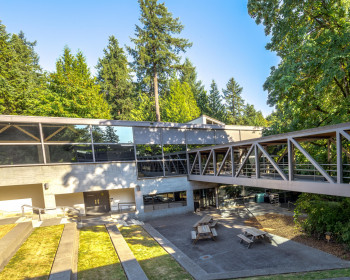National Enviro Moot Court Team Advances to Semi-Finals
Open gallery

Lewis & Clark Law School’s 2021 environmental law moot court team of Alex Houston and Michael Benjamin Smith (both 3 L’s), and Haley Nicholson (2L), coached by Professor Craig Johnston, advanced as far as the semi-finals of the national environmental law moot court competition this spring. The Jeffrey G. Miller National Environmental Law Moot Court Competition (NELMCC) – normally held at Pace Law School in White Plains, New York but due to the pandemic was all online - is “the largest interschool moot court competition of any kind under one roof, regularly attracting 200 competitors from law schools from all over the nation” according to its website.
Professor Craig Johnston has coached the Lewis & Clark team for 30 years - and with incredible success, including:
- winning the national championship seven times in the last 30 years; no other school has won more than three times.
- advanced to the finals (top 3 teams) in 15 of the last 30 years (including a streak of seven years in a row)
- advanced to the semi-finals (top 9 teams) in 24 of the 30 years (including a streak of nine years in a row)
-advanced to the quarterfinals (top 27 teams) in 28 of the last 30 years
Regardless of the formal outcome of the national competition this year, Prof. Johnston commented that “it was an incredible pleasure to work with Alex, Haley, and Michael. Not only were they a national-championship caliber team, they were a coach’s dream to work with—incredibly smart, hard-working, and with fantastic, ego-less attitudes. What else can a coach ask for?”
Michael Benjamin Smith summed up the experience: “Moot court was the best practical training I received in a law-school classroom. Professor Johnston’s mastery of substantive environmental law and broad experience as a practitioner, combined with his dedication to students and passion for excellence, make him a spectacular mentor. The crucible of practice rounds developed my instincts—like no other class—to discern between a winning legal argument and one that won’t withstand tough questioning. Moot court sets a high bar. Professor Johnston, along with the faculty and alumni who judge rounds and provide feedback, are committed to helping students reach it.”
The moot court process starts each fall when Prof. Johnston teaches an Environmental Advocacy course to second and third-year law students. The class centers on a moot court experience, but includes much more than that. During the first four or five weeks, each student prepares a brief on a particularly thorny environmental problem laid out by Johnston. Over a three-week period, students engage in six rounds of oral argument regarding the problem. The last three of these are competition rounds, which take place in front of a panel of faculty, alums, and practitioners from the community, giving the students the opportunity to practice thinking on their feet and responding to difficult questions and comments.
The top three advocates to emerge from these rounds are offered the chance to participate as part of the Lewis & Clark team for the national environmental law competition. The national team then writes a brief (due around Thanksgiving) for the competition and begins a series of intense practice rounds – again in front of lawyers from throughout the faculty and community - in preparation for the competition.
Each year the team puts in extraordinary hours to achieve mastery of the subject and law with up to 30 or more practice rounds. As a past moot court participant noted: “moot court was the single most challenging and rewarding experience I have had in an academic context. The name ‘moot court’ belies its true impact. Somewhat ironically, it is the realest thing I’ve done in law school. It is a training ground for the world of competent and confident lawyering. Under Professor Johnston’s passionate and intensely focused tutelage, you feel like a lump of clay being molded into something with real form, substance and character. It is a process. It is a challenge. It is explosive growth. And it was an absolute pleasure to be a part of it.”
For more information about the moot court class and competition click here.
Below is a chart of Lewis & Clark Law School teams’ success at the national competition (the competition typically involves teams from somewhere between 68 and 84 law schools):
Champions:
1994 - Jenifer Johnston, Nancy Perry and Scott Shapiro
1995 - Leah Christensen, Jenifer Johnston and Nancy Perry
2002 - Allison LaPlante, Tanya Sanerib and Tyson Smith
2004 - Dave Jones-Landry, Isa Lester and Kristin Ruether
2008 - Bethany Cotton, Liz Crosson and Diana Federoff
2009 - Tarah Heinzen, Erica Maharg and Lizzy Zultoski
2010 - John Krallman, Ben Luckett and Lizzy Zultoski
Finalists (top 3):
1992 - Mike Halloran, Stephanie Parent and Vickie Thimmesch
1997 - Paul Conable, Ken Larish and Julie Weis
1998 - Chris Panoff, K.C. Schefski and Peter Scott
2001 - Melissa Powers, Allison LaPlante and Tanya Sanerib
2007 - Dan Mensher, Jamie Saul and Ellen Trescott
2011 – Ellie Dawson, John Krallman, and Marla Nelson
2012 – Marla Nelson, Meredith Price, and Daniel Timmons
2013 - Andy Erickson, Maggie Hall, and Meredith Price
Semifinalists (top 9):
1993 - Scott Ames, Edie Matulka and Sam Rauch
1996 - Ken Larish, Dana Messenger and Julie Weis
2006 - Dawn Dickman, Dan Mensher and Tami Santelli
2014 – Laura Kerr, Daniel Rottenberg, and Ben Saver
2015 – Daniel Rottenberg, Jake Duginski, and Stephanie Grant
2016 – Josh Fortenbery, Cameron Jimmo, and Kathryn Roberts
2017 – Kathryn Roberts, Amy Saack, and Rachel Briggs
2021 – Michael Benjamin Smith, Alex Houston, and Haley Nicholson
Quarterfinalists at Pace (top 27):
1999 - Wendi Hammond, Mike Newhouse and K.C. Schefski
2000 - Wendi Hammond, Mike Newhouse and Melissa Powers
2003 - Lance Clark, Chris Len and Tyson Smith
2018 – Rachel Briggs, Andrew Futerman, and Kacy Manahan
2019 – Rachel Blackburn, Sangye Ince-Johannsen, and Ben Scissors
More Environmental, Natural Resources, & Energy Law Stories
Environmental, Natural Resources, and Energy Law is located in Wood Hall on the Law Campus.
MSC: 51
email elaw@lclark.edu
voice 503-768-6649
Environmental, Natural Resources, and Energy Law
Lewis & Clark Law School
10101 S. Terwilliger Boulevard MSC 51
Portland OR 97219

